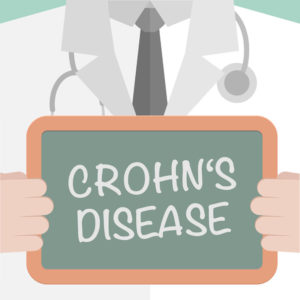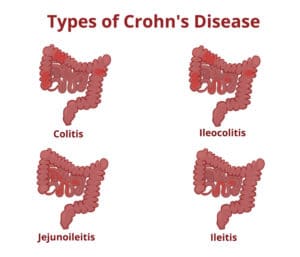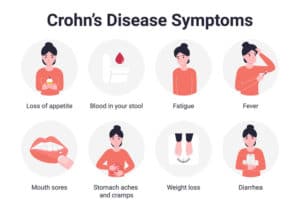
Apply for a medical marijuana card at TeleLeaf RX Pennsylvania today!
Crohn’s disease is a type of Inflammatory Bowel Disease (IBD) affecting as many as 1.6 million Americans.
Most patients are diagnosed before the age of 35.
The Center for Disease Control and Prevention (CDC) reported that the prevalence of IBD increased from 2001 to 2018 for all race and ethnicity groups.
There was a higher increase rate among non-Hispanic Black adults.
Research is still in the early stages regarding the impact of medical marijuana to Crohn’s. However, small clinical studies involving patients with the condition indicate that it might help with inflammation and decreased appetite.
It’s an inflammatory bowel disease that causes chronic inflammation and damage to the gastrointestinal (GI) tract.
It can affect any part of the GI tract, from the mouth to the anus. It most commonly affects the end of the small intestine (the ileum) where it joins the beginning of the colon.

The real cause of Crohn’s disease is unknown. Experts agree that the cause may be genetic or infectious.
Individuals who have a viral or bacterial illness, or exposure to another environmental trigger could cause those with a genetically higher risk for Crohn’s to develop the condition.
The following are some identified factors that can increase your risk of developing Crohn’s disease:
Chronic conditions of Crohn’s disease are ongoing and long-term. Some individuals diagnosed with the disease usually have the same life expectancy as those without Crohn’s disease. This means that they typically lead full, happy, and productive lives.
The best way for patients with Crohn’s disease to live normal lives is by taking medications as prescribed by their doctor or other health care professionals.
Health professionals would usually find the best treatment depending on what works best for the symptoms you are experiencing.
The common treatments:
The Crohn’s and Colitis Foundation reported that medical marijuana has improved IBD symptoms like pain, nausea, and decreased appetite.
Flare-ups that happen because of Crohn’s disease can disrupt daily life. You can keep the disease in check by using medical marijuana to manage the symptoms.
Crohn’s disease patients can qualify for medical marijuana in the state of Pennsylvania.
Visit TeleLeaf RX or give us a call to start applying for a medical marijuana card!
